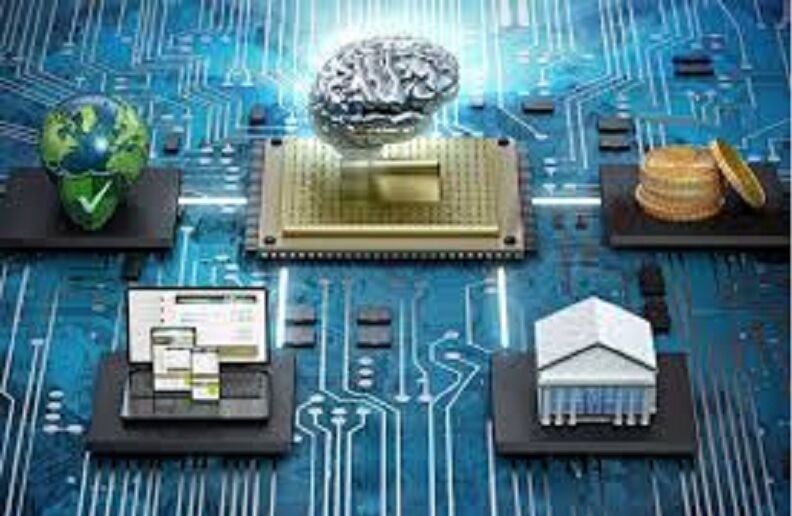The future of quantum computing: What to expect

The term quantum computer lately? It’s been popping up a lot in scientific chit-chats. Why, you ask? Well, these bad boys can do computations at lightning speed, way faster than your everyday computer! the world of quantum computing is like getting express shipping on everything from making new medicines to optimizing investment portfolios.
So what’s all this fuss about quantum computers and how can they change our future? In simple terms, a quantum computer uses tiny particles like electrons and atoms to work its magic. These powerful machines might just be the key to solving some of the biggest challenges we face today.
But with great power comes great responsibility – remember Uncle Ben’s wise words in Spiderman! As we’re gearing up for the era of quantum computing, it’s super important that we think about the ethical side of things too. What changes could this bring to our society? Stick around as we dig deeper into this exciting new reality of quantum computing and what it could mean for us.
The basics of quantum computing

The concept of quantum computing an overview
Quantum computing, as the term implies, is a fusion of quantum mechanics and computational processes. It stands at the intersection of these two disciplines, representing an exciting frontier in scientific innovation. In contrast to classical computing that employs binary digits (bits) – strictly 0s or 1s – for data encoding, quantum computers deploy what are known as quantum bits or qubits. These qubits distinguish themselves through their unique capacity to simultaneously exist in a state of 0, 1, or intriguingly enough, both 0 and 1 concurrently. This powerful concept is labeled superposition and it is precisely this characteristic that furnishes quantum computing with its remarkable computational strength.
How quantum computing differs from classical computing
When you think of computers, the mind generally paints an image of binary computation – a string of ones and zeros running through a silicon chip. That’s the world of classical computing. On the other hand, in the apparent universe of quantum computing, things are a tad bit different; they are disarranged, interdependent, and nonlinear.
Quantum computers rely on qubits, which outperform bits in classical computing, as they can exist in multiple states at once. This is due to the role of superposition, enabling them to perform many calculations simultaneously, offering an exponential increase in computational speed. Moreover, another quantum mechanical phenomenon, known as entanglement, allows qubits to be dependent on each other. Consequently, a change in the state of one qubit results in an immediate change in others, providing immense computational potential. The future of quantum computing, thus, is paving the way for computations that are beyond the grasp of classical computing.
Significant progress in quantum computing

As we delve into the future prospects of quantum computing, it is imperative to acknowledge some groundbreaking advancements that indicate forthcoming expectations. Prominent technology corporations such as IBM, Google, Microsoft, and Amazon are expediting innovations in this compelling field. These progressions encompass a spectrum from Google’s achievement of quantum supremacy, the fabrication of quantum processors, to experimental trials on the quantum internet.
The role of quantum algorithms and error correction
Finding practical applications for quantum computing hinges on advancements in quantum algorithms and error correction. A key concept in this regard is the noisy intermediate-scale quantum (NISQ), a notion that presented short-term benefits from quantum computing even before achieving large-scale error-correcting quantum systems. It’s important to note that the emphasis is shifting, with many experts and companies actively pursuing classic forms of error correction.
In 2023, companies like Google Quantum AI and Quantinuum demonstrated that qubits, the basic units of quantum information, can be assembled into error-correcting ensembles that outperform the underlying physical qubits. This monumental stride towards reliable quantum computing signifies a lesser susceptibility of quantum computers to computational errors, enhancing their usability and practicality.
Development of quantum hardware
The journey towards a quantum future also depends significantly on the growth and development of quantum hardware. Quantum computing hardware operates on principles entirely different from those of classical computers. This requires not just a shift in theoretical understanding, but also practical hardware development, which is no small challenge.
Large tech companies are prominently at the forefront here. IBM, Google, and Microsoft provide insight into their plans and projections for advancing quantum computing technology over the years. For instance, IBM and Google have public hardware development roadmaps, pointing to their commitment to driving quantum advancements.
Innovations are not limited to large tech companies. For example, SandboxAQ, an Alphabet Inc. spin-off, released the AQtive Guard platform, an end-to-end cryptographic management system facilitating the transition to post-quantum security.
Navigating through these remarkable advancements in quantum computing, it’s clear that the science of today is setting the stage for the technology of tomorrow. Would you like to be part of this quantum leap? Keep an eye on these key advancements as they’re pivotal to predicting what the future holds.
Possible implementations and consequences

Quantum Computing, a prospective catalyst in the realm of technological innovation, introduces revolutionary applications that hold the capacity to reshape our imminent future. Nonetheless, this technology is not devoid of its own array of complexities and repercussions.
Advancements in machine learning and optimisation
Recognize that quantum computing holds immense potential in the realm of machine learning and optimisation. Let’s look at qubits, for instance. As quantum computing employs qubits, it offers the power to process vast amounts of information in mere moments. This robust processing capability has the potential to solve complex equations, exponentially faster than traditional computers. Equations that might take traditional computers tens of thousands of years to decipher, quantum computing solves in mere minutes.
Such prowess could fundamentally change the landscape of machine learning, allowing for more advanced, faster decision-making algorithms and streamlined processing capabilities. Quantum computers, with their ability to simultaneously process multiple possibilities, could lead to revolutionary advancements in predictive analytics, optimization problems, and automated systems.
Impact on cryptography and security
As you consider the impact of quantum computing on cryptography and security, it’s important to note the potential it presents. Quantum computing represents a double-edged sword in the realm of security – both a potential threat and a promise for enhanced security measures.
On one hand, the processing power of quantum computers could crack existing cryptosystems, posing a potential security threat. This same power, however, when used proactively, could strengthen security measures immensely.
You see, quantum cybersecurity utilizes the principles of quantum mechanics to secure communications against eavesdropping. So, while it might pose a threat to conventional cryptography, it simultaneously holds the promise to develop vastly superior cryptographic techniques in the future.
As Quantum Computing strides forward, it’s essential to stay informed about these pivotal advancements shaping the Future of Quantum Computing. Just like with every technological evolution, it’s crucial to expect and be prepared for the unexpected.
Challenges and limitations
With the promise of a quantum revolution on the horizon, it’s important to understand the roadblocks standing in the path of broad quantum computing implementation. These hurdles range from intricate technical glitches to colossal ethical and security dilemmas that society needs to address to responsibly harness quantum advantages.
Technical challenges and the quest for stability
At the heart of quantum computing lies its greatest challenge – its intricacy and the requirement for absolute precision. Small disruptions such as heat or minor electromagnetic interference can throw qubits off-kilter, leading to calculation errors.
Put succinctly, the issue lies in the preservation of the quantum state for as long as possible. Quantum’s advantages need to outsupersede these classical methods, and technical experts are striving hard to create quantum error correction protocols that pull down the propensity of error production.
Moreover, the implementation of noisy intermediate scale quantum (NISQ) net positive outcomes haven’t been as encouraging as anticipated.
Ethical and security concerns
By unlocking quantum computing, you’re also opening the vault to fundamental ethical and security predicaments. How can we ensure data privacy and especially a fair quantum playing field when data can be transmitted instantaneously and securely?
The burgeoning quantum internet, although secure, can potentially recalibrate communication norms and introduce invasive tactics. Simultaneously, anticipating potential loopholes and their exploitation necessitates proactive security measures.
The challenges associated with error correction and security are progressively being addressed, thereby facilitating a promising outlook for this technology. With expected developments in biotechnology imminent and the emergence of topological quantum computers, the forthcoming decade promises transformative shifts. As sectors increasingly adopt quantum solutions, we stand at the precipice of an unprecedented revolution – particularly in solving complex problems.
Want to no more, Exploring the world of ethical hacking. Ethical hacking is the practice of using hacking techniques to test the security of a computer system or network. Ethical hackers, also known as white hat hackers, are hired by organisations to find and fix security vulnerabilities before malicious hackers can exploit them. In its article, CyberGhost talked about ethical hackers and the need for more professional and ethical hackers in various industries.
Latest Thailand News
Follow The Thaiger on Google News:


























